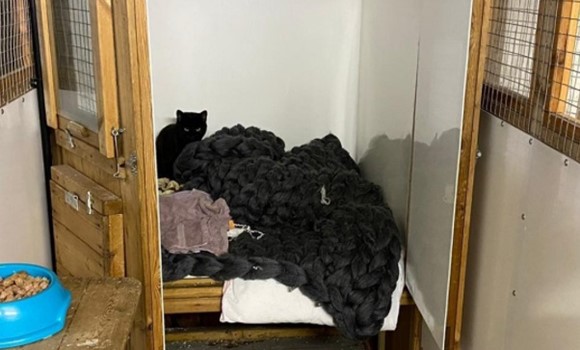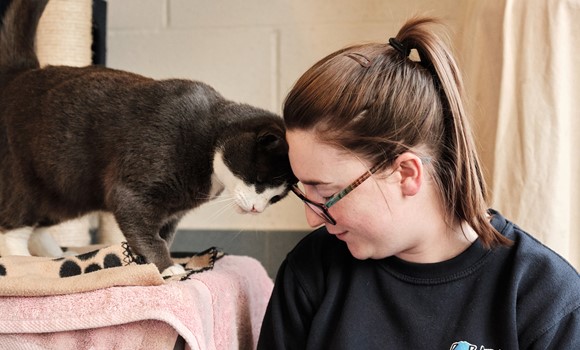

Charity Overview
Battersea takes in every animal who needs them. Every dog and cat is given love and expert care as Battersea gets to know their characters and quirks so they are able to find them a new home that’s just right for them. They help people to make informed choices when getting a pet, provide training and welfare advice and campaign for changes in the law when they see that dogs and cats or their owners deserve better.
All knowledge gathered in their centres helps Battersea to improve the lives of dogs and cats everywhere, including those they will never meet. Through the Battersea Academy and their grants programme they are able support other rescue organisations and charities, providing training and financial support that empowers them to be the best they can be and helping more animals than ever before.


Project Summary
Funding is a significant barrier for many rescue centres and welfare organisations wanting to make changes to improve the wellbeing of dogs and cats in their care. Understanding this issue, Battersea established a grants programme to provide financial support and ongoing advice to organisations to achieve positive change for dogs and cats that need our help.
With ICAP’s generous funding we have awarded grants that will have a huge impact at a time when many rescues have been struggling because of the pandemic. From essential improvements to facilities to increased staffing and access to additional resources, ICAP is helping us be there for dogs and cats across the UK; not just those that come directly to us.Paul Marvell, Executive Head of Global Programmes
Funding from ICAP Charity Day 2020 was originally intended to help fund the 2021 Academy Grants Programmes, through which grants are awarded to organisations that have attended a Battersea Academy programme and want to implement changes identified as a result of their attendance. Sadly due to the Covid 19 pandemic, Battersea were unable to deliver their full Academy Programmes in 2021.
Being able to access the support of the most qualified behaviourist we have a working relationship with helped us get Freddie into a position where his welfare was no longer a concern. Having the funding in place for our behaviour project meant that we were able to easily allocate resources to a dog in need.Staff at Aireworth
Instead, they broadened the impact of ICAP’s funding through their wider Grants programme, ensuring the money would still help UK-based animal welfare organisations to raise standards, improve existing or develop new facilities or, more recently, adapt to the changing demands brought about as a result of the pandemic.
The shelter is lovely and clean and secure and gives great comfort to the cats who enter our care. It is a much more pleasant experience for everyone who looks after the shelter and who visits. We are very fortunate and very lucky indeed. Thank you.Staff at Cheshire Cats
Thanks to ICAP Charity Day, Battersea were able to award 23 grants to UK-based organisations in 2021.
Examples of organisations Battersea has awarded grants to with ICAP’s support:
Like many rescue centres across the UK during the height of the pandemic, Aireworth Dogs in Need found that an increasing number of dogs coming to them had more complex behavioural issues.
As an organisation run entirely by voluntary foster carers, they didn’t always have the specialist skills and experience to provide the additional training and care dogs needed to prepare them for a new home, and the pandemic made it harder for them to offer their usual level of support and contact.
Aireworth applied to Battersea for a Covid 19 Recovery Grant to be able to access specialist behaviourists when required, and kennel space at a rehabilitation kennel.
One dog to have benefited was Freddie, a 7 year old Cocker Spaniel who was brought in to Aireworth after his owners were unable to cope with his resource guarding (excessively protecting his toys and food). It became clear he was fearful and anxious, barking excessively in response to noises and to demand response from his carers.
The team arranged for a clinical behaviourist to carry out a full assessment and provide support and instructions for the foster carer to train alternative behaviours, along with counter-conditioning and desensitisation
As a result of the individual support, the frequency and intensity of Freddie’s barking gradually reduced to a point where he was settled enough to be able to cope with changes to his environment, and was ready to be rehomed.
Cheshire Cats is a small volunteer group that aims to rescue, rehabilitate, socialise and home stray cats from across the Cheshire and Manchester area. They place cats in temporary foster homes to help them transition to a life in a warm, loving, safe home, and become socialised ready to be placed in a permanent new home.
Before going to a foster family, many come on site for emergency shelter, assessment or to receive medical care.
Having taken in over 200 cats in 2020, Cheshire Cats expected to take in over 450 cats in 2021 (reflecting the increase in the number of cats requiring help during the pandemic), but the existing shelter was inefficient and costly to run and didn’t provide enough accommodation to meet the increasing number of stray cats needing to be looked after.
To help meet demand, the organisation applied for a grant to build a new shelter that would increase the number of cats it could care for. The improved facilities are welcoming and easy to maintain and the new shelter has a dedicated electrical supply with heating in the individual pods and lighting which makes it safer and easier to use in the dark.
Staff at Cheshire Cats said: “The shelter is lovely and clean and secure and gives great comfort to the cats who enter our care. It is a much more pleasant experience for everyone who looks after the shelter and who visits. We are very fortunate and very lucky indeed. Thank you”


